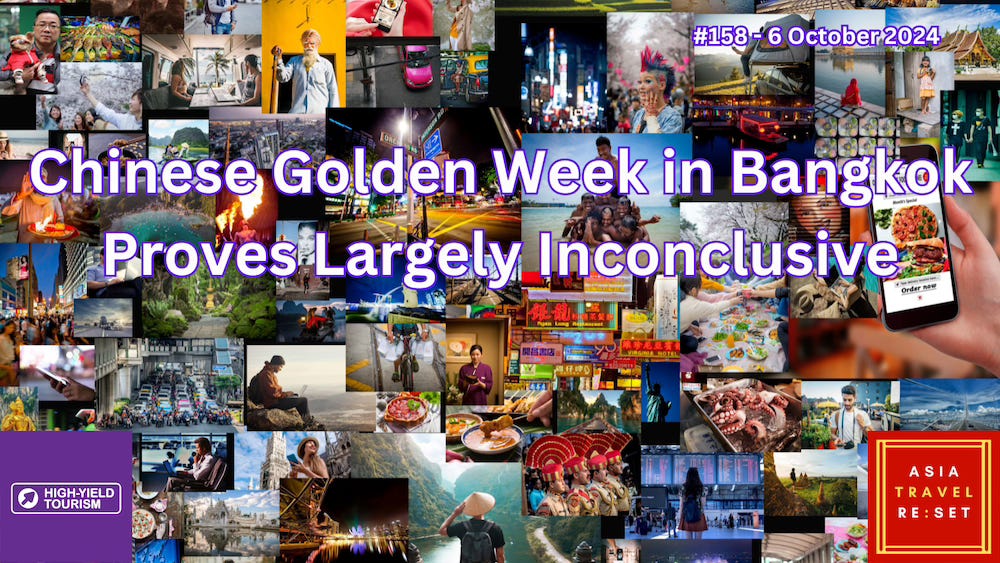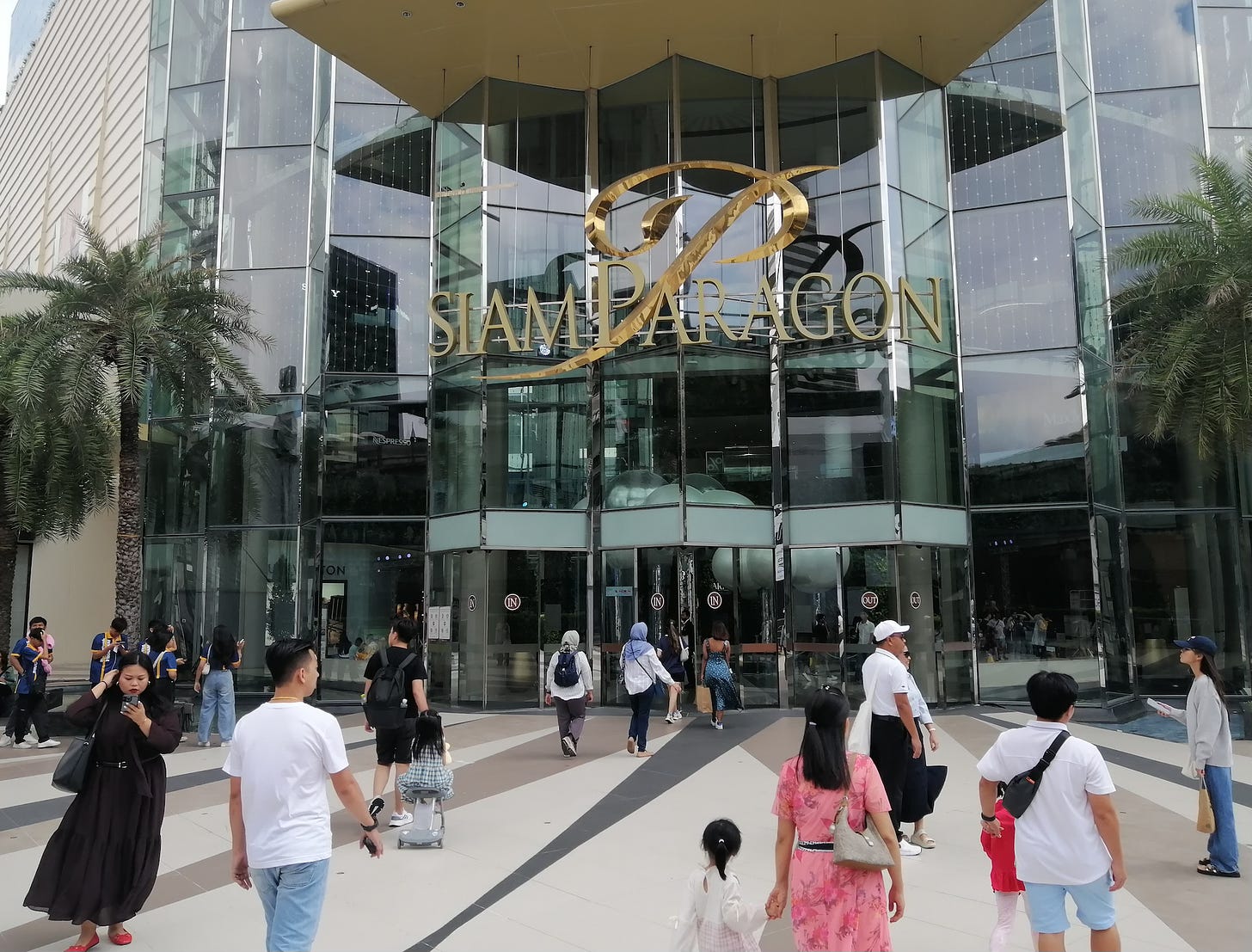Issue #158: Chinese Golden Week in Bangkok Proves Largely Inconclusive
Thailand estimates a 64-88% Chinese tourist recovery range versus 2019
Welcome to Issue 158 of Asia Travel Re:Set.
In 2019, no country received more Chinese tourists than Thailand. Around 11 million flew from cities across China into (primarily) Bangkok and Phuket.
So this week, I headed to the (very rainy) Thai capital to check out the ongoing outbound recovery during China National Day Golden Week.
So let’s follow that train of thought.
Thanks for checking in.
"Chinese social app Xiaohongshu is reshaping Chinese tourists’ experiences in South East Asia, elevating nondescript locales to must-see attractions." Thanks to Zhaoyin Feng for including some of my comments in this broad-ranging piece for Rest of World about the role of "Red" in China’s unfolding outbound recovery. Click HERE to read Xiaohongshu has revolutionized Chinese tourism in Southeast Asia.
Austria is promoting outdoor adventure to Chinese tourists. "Seasonal variations in climate and landscape enable it to promote hiking and soft adventure during spring and summer, and skiing and snowy sightseeing in winter. Visitors post user-generated videos set against seasonally inspired backdrops, which is hugely powerful for social advocacy across the calendar." Thanks to Mingjie Wang for featuring some of my comments in this detailed article for China Daily. Click HERE to read Scenic Austria Seeking Chinese Visitors.
Chinese Golden Week in Bangkok Proves Largely Inconclusive
Bangkok rolled out the Golden Week red carpet for Chinese tourists. The neatly timed Bangkok International Fashion Week took place at Siam Paragon, Singaporean pop star JJ Lim sold out the Impact Arena and Butterbear collabs and retail deals were ubiquitous.
The Thai capital is among a handful of APAC cities - such as Seoul, Tokyo, Shanghai and Melbourne - which “get” that tourism is now about “enabling lifestyles” rather than the increasingly derivative “creating experiences”. The difference is real: one empowers visitors to make their own moments, the other is supply-side marketing.
But, the results were inconclusive. There were plenty of Chinese tourists in town, though I’ve seen many more during previous Golden Weeks. It felt a little low-key. A sign of changing travel preferences? Perhaps. China’s tourism revival is still reshaping.
The weather didn’t help. It will be interesting to see if the frequent rain storms impact Golden Week bookings in 12 months time - especially given that parts of northern Thailand, including Chiang Mai, have been flooded. The climate is changing.
This brings us to the question of whether the travel industry over-emphasises China’s 3 Golden Weeks? Again, perhaps.
The regional importance of October Golden Week is tri-fold: 1) Unlike Lunar New Year and May Labor Day, this is specifically a Chinese holiday. 2) It’s an otherwise slow week for leisure travel. 3) It kickstarts Q4, a vital tourism period in Asia Pacific.
BUT - and this may be an important caveat - the week before October Golden Week, I was in Phuket, where there were lots of Chinese group tours. I asked several visitors why they chose to travel pre-Golden Week. The answer was unanimous: “Air fares and hotels are cheaper, and it’s less crowded.” Worth noting in future.
One Year On…
On 3 October 2023, a fatal shooting of a Chinese visitor at Siam Paragon, a popular tourist hotspot in central Bangkok, threatened to derail Thailand’s coordinated Golden Week strategy to reboot its Chinese inbound market.
This occurred at a time when outbound traffic was still sluggish and 2 Chinese movies, No More Bets and Lost in the Stars, about kidnapping, ID theft and extortion involving travellers in South East Asia had gone viral. The fact that the shooting went unmentioned 12 months later is largely due to the Tourism Diplomacy of ex-Thai Prime Minister Srettha Thavisin. He immediately undertook a 4-day visit to China to assure political leaders that Thailand would guarantee the safety of Chinese tourists. They backed him.
A 64%-88% Recovery Range
Thailand’s tourism metrics are carefully calculated. From 1-7 October, it forecast 132,000-183,000 Chinese visitors (flying in from 43 cities to 6 airports - with the majority arriving at Bangkok’s 2 main airports). That would represent a 64%-88% Chinese recovery compared to October Golden Week 2019. Quite a range.
Although China-Thailand air connectivity is about 17% down on 2019, it’s still sizeable. And Bangkok is a perennial Golden Week hotspot. Chinese OTA Qunar placed it alongside Hong Kong, Kuala Lumpur, Seoul and Osaka as cities with the most flight bookings last week.
Budget constraints were priced in, too, Trip.com noted:
“When it comes to travel costs, the top outbound destinations (Japan, Thailand, South Korea, Malaysia, Vietnam, Singapore, the Philippines, Australia, the UK, and the USA) have all seen a significant drop in average air ticket prices.”
Personally, I think this October Golden Week marks another step forward in China’s shape-sifting return to international tourism. No more, no less. The newsworthy (percentage) growth figures for Golden Week will be in less mature destinations. I’m not reading too much into Bangkok’s comparatively low-key 7 days.
The really interesting across-the-calendar benchmarks to watch will come in 2025 - once China’s outbound rebuild passes its 2nd anniversary.
Meanwhile, here’s a bit more about Butterbear….
Butterbear is a Bangkok bakery whose animated social media dance videos have gained a cult following in China. The brand is leveraging its social stardom with various retail-related collabs - and featured in a Tourism Authority of Thailand campaign in China. For Golden Week it partnered with indie fashion store Gentle Woman, whose Thai-Korean aesthetic attracts Gen Z shoppers from across Asia.
October Golden Week kickstarts Q4, so The South East Asia Travel Show analysed the top 8 talking points from the final month of Q3. In September, Thailand pondered launching an Electronic Travel Authorisation system, and Royal Assent of the Marriage Equality Bill made it Asia’s 3rd jurisdiction to legalise same-sex unions.
Elsewhere, AirAsia grabbed headlines and Bali floated a possible hotel construction moratorium. Plus, a Singaporean university attempted to balance the challenges and potential benefits of a surge in tourist visitors.
Listen to 'Tourist Taxes, University Tourism & A Hotel Building Ban, September 2024 in Review,’ here:
Or search for The South East Asia Travel Show on any podcast app.
And, that’s a wrap for issue 158.
Asia Travel Re:Set will return next Sunday.
Meanwhile, find me at LinkedIn, The South East Asia Travel Show and High-Yield Tourism.
Happy travels,
Gary










